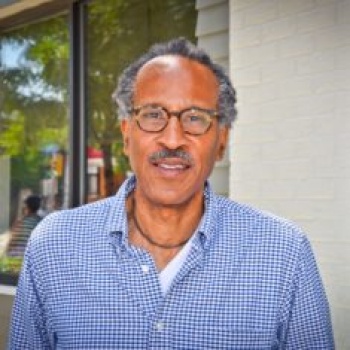Louis J. Massiah
Louis J. Massiah
Documentary Filmmaker
Founder/Director, Scribe Video Center
Visiting Scholar 2022-2023
Professor Vivek Bald, MIT Comparative Media Studies/Writing Program

Bio
Louis J. Massiah (MIT, SM '82) is a documentary filmmaker and the founder/director of Scribe Video Center in Philadelphia. His innovative approach to documentary filmmaking and community media haa earned him numerous honors, including a MacArthur Fellowship (1996-2001), two Rockefeller/Tribeca fellowships, and a Pew Fellowship in the Arts. Through Scribe, he assists emerging filmmakers in authoring their own stories, including the Precious Places Community History Project, Muslim Voices of Philadelphia, and The Great Migration - A City Transformed. His award-winning documentaries, The Bombing of Osage Avenue (1986), W.E.B. Du Bois – A Biography in Four Voices (1996), two films for the Eyes on the Prize II series (1987), A is for Anarchist, B is for Brown (2002), and The Interrogative Portrait series: How to Make A Flower: La Méthode MOBO (2020), What I See: Don Camp (2021), and most recently, Why Black Film? – A Conversation with Pearl Bowser (2023) have screened at festivals, galleries, and museums throughout the U.S., Europe, and Africa, and broadcast on public television. In 2011, Massiah was commissioned to create a five-channel permanent video installation for the National Park Service’s President’s House historic site. Other projects include video installations for The President’s House: Freedom and Slavery in the Making of a Nation and the Musée des Civilisations Noires in Dakar, Senegal. Massiah is the project director and co-programmer of We Tell: 50 Years of Participatory Community Media. He holds a Master of Science in Visual Studies from MIT.
Filmography
- The Bombing of Osage Avenue (director/producer), 1986
- Eyes on the Prize (director/producer/writer - 2 episodes)
- A Nation of Law?: 1968-1971, 1990
- Power!: 1966-1968, 1990
- W.E.B. Du Bois: A Biography in Four Voices (director/producer), 1996
- Louise Thompson Patterson: In Her Own Words, 1996
- A is for Anarchist, B is for Brown, 2002
- American Experience (producer/director/writer - 2 episodes)
- Eyes on the Prize II (Parts V & VI): Ain't Gonna' Shuffle No More/A Nation of Law?, 2008
- Eyes on the Prize II (Parts III & IV): Power!/The Promised Land, 2008
- For Memories' Sake (executive producer), 2010
- Standing at the Scratch Line (executive producer), 2016
- How to Make A Flower: La Méthode MOBO (director), 2020
At MIT
W.E.B. Du Bois – A Biography in Four Voices, MIT Comparative Media Studies/Writing Program, 16 November 2023
Global France Seminar presents La Parisienne Démystifiée, MIT Global France Seminar, 6 April 2023
Media and Methods For Community-Based Archiving, MIT Open Documentary Lab, 24 January 2023
Virtual OpenDocLab Talk: Louis Massiah & Patricia Zimmermann, School of Humanities, Arts, and Social Sciences (SHASS), 20 April 2021
Cizek, K., Uricchio, W., Massiah, L., Mertes, C., & Winger-Bearskin, A. (2019). PART 2: HOW TO CO-CREATE: PRACTICAL LESSONS FROM THE FIELD. In Collective Wisdom (1st ed.). https://doi.org/10.21428/ba67f642.f7c1b7e5
Awards and honors, MIT News, 24 July 1996.
Du Bois film to have advance showing here, MIT News, 15 November 1995
Visiting Artist in Film, MIT Comparative Media Studies/Writing Program, 1995
Massiah, Louis. "Event and idea : a writer's approach to the videotape documentary." Masters Thesis. Department of Architecture, Massachusetts Institute of Technology, 1982.
How Not to Make a Documentary (2012)
Adam Enatsky and Paul Kim produced an informative and funny video called "How Not to Make a Documentary." Their video profiles documentary filmmaker and cultural worker Louis Massiah, while at the same time chronicles pitfalls novice doc filmmakers should avoid.
The Center for Social Media teamed up with MIT's New Media Literacy project to create three video exemplars with six American University School of Communication students. At the Center, the project was co-lead by SOC's Maggie Burnette Stogner and CAS's Celine-Marie Pascale. These exemplars are intended to help educators explore the skills needed to create new media with their students, and to be used as models to help students create their own exemplars.